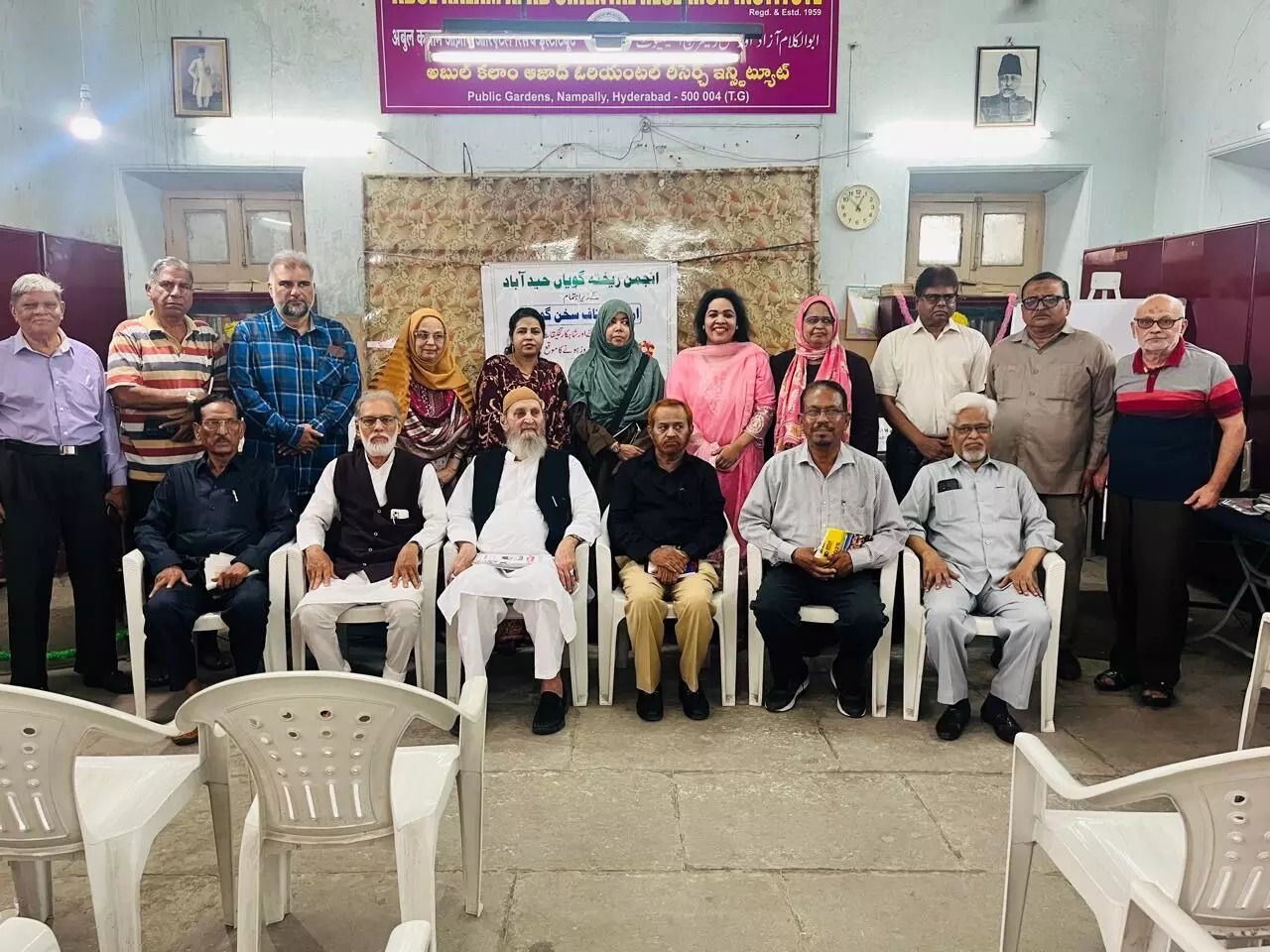‘Best way to learn Urdu’: Hyderabadis gather at Public Garden over love for Urdu poetry, prose
It’s a diverse group of people united by a shared love for the Urdu language and its timeless literary treasures
By J.S. Ifthekhar
‘Best way to learn Urdu’: Hyderabadis gather at Public Garden over love for Urdu poetry, prose
Hyderabad: Some come here to jog and stay fit, some to soak in the fresh air and a few to relax and unwind. But of late, the Public Garden has gained a new identity. It is no longer just a space for physical rejuvenation, but a place where minds are being enriched, and hearts stirred, all through the power of Urdu literature.
Sunday mornings witness a different set of people descending here. They come to quench their thirst for Urdu and its literature. It’s a diverse group of people united by a shared love for the Urdu language and its timeless literary treasures.
A common purpose, a common love
From students and homemakers to retired professionals and young enthusiasts, they come together with a common purpose: to listen, to reflect and to reconnect with a language that has been the soul of Hyderabad’s cultural identity for centuries.
This revival of interest in Urdu can be largely credited to Dr Javeed Kamal, a retired professor and a passionate Urdu aficionado. Concerned by the waning interest in the language, he decided to take matters into his own hands. Under the banner of Urdu Asnafe Suqan Goee, he has launched a weekly book reading programme at the Moulana Azad Oriental Research Institute in the Public Garden.
Engaging and dramatic readings
The idea is simple yet powerful—to bring people closer to the beauty of Urdu literature through engaging and dramatic readings of stories, essays and poetry.
The initiative, which began recently, has already conducted three successful sessions, each one drawing a larger and more enthusiastic crowd than the last. These aren’t mere readings—they are vibrant performances.
Through expressive narration and theatrical presentation, the stories come alive, holding the audience spellbound for two full hours—a remarkable feat in today’s world of shortened attention spans and constant digital distractions.
Curated selection of literary works
Each session features a thoughtfully curated selection of literary works, ranging from poignant essays and historical dramas to satire, humour, and soulful poetry. The programme explores various genres, ensuring that the audience is treated to a diverse and enriching experience every week.
Whether it’s the satirical brilliance of Mujtaba Hussain’s humorous write-ups or the emotional depth of Imtiaz Ali Taj’s famous drama Anarkali, the sessions cater to a wide spectrum of literary tastes.
One of the major highlights has been the dramatic presentation of Allama Iqbal’s masterpieces Shikwa and Jawab-e-Shikwa. The powerful delivery and poetic depth left the audience mesmerised, rekindling a sense of pride and emotional connection to the language.
Committed organisers
The organisers make a conscious effort to balance entertainment with education, ensuring that each session is not only enjoyable but also intellectually stimulating.
Supporting Dr Kamal in this initiative is a committed team of literary enthusiasts: Dr Humaira Sayeed, Dr Atiya Mujeeb Arafi, Rafia Nausheen, Javeed Muhiuddin and Lateefuddin Lateef, each bringing their own flair and passion to the programme. Their combined efforts have transformed Sunday mornings into an eagerly awaited cultural experience.
Everyone is welcome
What’s particularly heartening is the diverse demographic this programme attracts. It’s not just the elderly or those with a traditional interest in Urdu; increasingly, youngsters and women are showing up, eager to immerse themselves in these sessions.
In an era where smartphones, social media, and digital noise often leave little room for reflection, this return to the oral tradition of storytelling and literary discussion is both refreshing and inspiring.
“This is the best way to learn Urdu,” says Dr Kamal, with a contented smile.
He believes that reviving a language doesn’t necessarily require formal classrooms or rigid curricula. Sometimes, all it takes is a group of passionate individuals, a shared space, and stories that speak to the soul.
The Asnafe Suqan Goee sessions offer more than just entertainment. They provide an avenue for self-discovery, cultural preservation, and intellectual growth.
They remind us that books are not relics of the past but living treasures that continue to enlighten and inspire. As the programme grows in popularity, it carries with it the potential to rekindle Hyderabad’s deep-rooted love for Urdu, one story at a time.